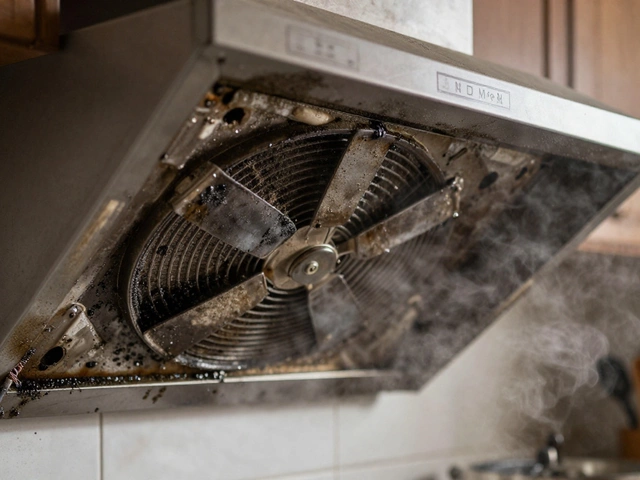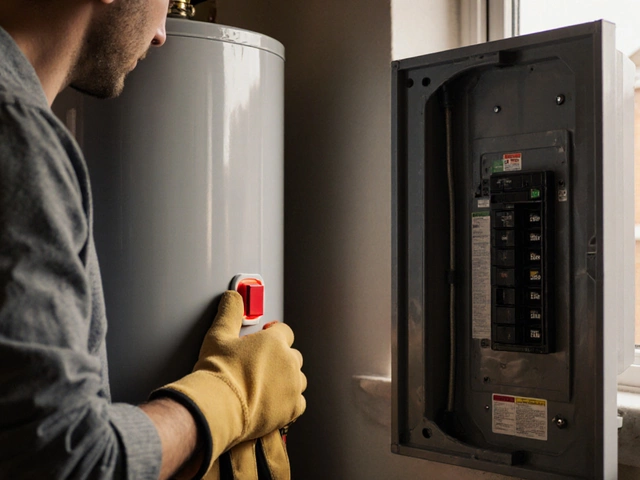If your kitchen smells like a sauna after a big meal, the extractor fan is probably not doing its job. A weak or noisy fan can ruin cooking comfort and even cause mould. The good news? Most fan problems are easy to spot and many can be solved without a pricey call‑out.
First, check the basics. Is the fan turned on? Does the switch work? Is the filter clogged with grease? A dirty filter reduces airflow dramatically, so give it a quick clean or replace it if it’s worn. Most fans have a removable mesh that you can wash with hot soapy water – let it dry completely before re‑installing.
When cleaning isn’t enough, you might need a new fan. Replacing a kitchen extractor fan yourself takes about an hour and a few tools: a screwdriver, a drill (if you need new mounting holes), and a ladder or sturdy step stool. Follow these steps:
1. Turn off the power at the circuit breaker – never rely on the wall switch alone.
2. Remove the old fan. Most units are held by a few screws and a metal bracket. Carefully disconnect the wiring – note which wires go to which terminals or snap a photo for reference.
3. Fit the new fan. Align the mounting bracket with the ceiling or cabinet opening, secure it with screws, and connect the wires using the same colour code (usually live, neutral, and earth).
4. Seal any gaps with silicone sealant to keep steam from leaking into the ceiling.
5. Switch the power back on and test the fan at low, medium, and high speeds. If it runs smoothly and pulls air efficiently, you’re done.
Our guide “How to Replace a Kitchen Extractor Fan Yourself” walks you through each step with photos and safety tips, so you won’t miss a detail.
Some issues are best left to a qualified tradesperson. If you notice any of these signs, call an expert:
Qualified electricians or specialized ventilation technicians have the tools to test motor windings, replace sealed units, and ensure everything complies with UK safety regulations. Our article “Who Repairs Extractor Fans?” explains which tradespeople have the right skills and how to choose a reputable service.
Another consideration is the fan’s lifespan. Most kitchen extractors last 8‑12 years. If your fan is older, even a perfect repair might only be a stop‑gap. The piece “Extractor Fan Replacement: How Often Should You Change Your Kitchen or Bathroom Fan?” helps you decide whether a replacement is smarter than a repair based on age, performance, and energy efficiency.
Regular maintenance makes a huge difference. Clean the filter every 1‑2 months, wipe the housing with a damp cloth, and check the vent duct for blockages. A quick once‑a‑year inspection of the ductwork can prevent ice‑build‑up in cold months and keep the fan humming quietly.
Bottom line: a well‑maintained extractor fan saves you time, money, and kitchen drama. Start with a basic cleaning, move to a DIY swap if needed, and know when to call a pro. With these tips, your kitchen will stay fresh and your cooking will stay enjoyable.

Discover how long extractor fans last, what shortens their life, and tips to maximize their lifespan in your kitchen or bathroom. Practical, clear advice from real experience.

Kitchen extractor fans typically last 10-15 years, but grease buildup and lack of cleaning can cut that in half. Learn the signs it's time to replace yours and how to choose a better model.

Experiencing a sudden loss of hot water can be inconvenient and potentially alarming. Understanding common reasons for this issue, such as thermostat malfunctions or a broken heating element, can help you troubleshoot the problem. Sometimes the solution is as simple as relighting the pilot light or adjusting the thermostat settings. For more complex issues, professional repair might be necessary. This article provides insightful tips and practical information to help you get your hot water flowing again.

Learn when it's safe to press the water heater reset button, step‑by‑step instructions, common risks, and when to call a professional.

Wondering if you can fix your microwave at home instead of tossing it and buying a new one? This article breaks down common microwave problems, what you can safely handle, and when it's better to call a pro. Get practical tips that actually make a difference, plus real talk about microwave safety. Save yourself time, money, and stress with easy-to-follow advice. Tackling your appliance repair just got a whole lot simpler.

Repairing a glass hob is an essential task for maintaining a functional and modern kitchen. The cost of fixing a glass hob can vary greatly depending on the damage's severity and the required repair type. This article delves into the various factors influencing repair costs, from crack treatment to replacement solutions. It also provides tips for maintenance to prolong the lifespan of your hob and prevent future damage.